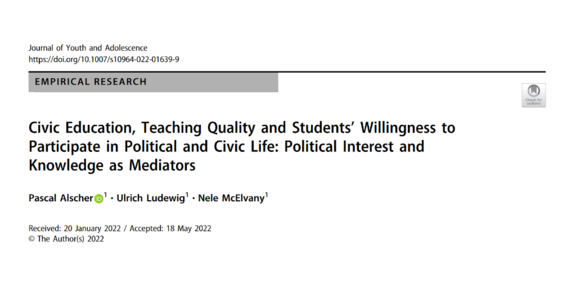New article published in Journal of Youth and Adolescence
- News
- Publikationen

Civic education is generally assumed to play a key role in youth’s political sophistication. It aims to equip young people with the necessary competencies and skills to effectively participate in political and civic life. However, few studies have examined the relative importance of different facets of teaching quality within civic education as well as mediating factors for fostering active citizens. The present study seeks to fill this gap by investigating how different facets of teaching quality are associated with adolescents’ willingness to participate in political and civic life and how this relationship is mediated by political knowledge and interest. The study uses original data from N = 250 students (n = 152 7th graders: Mage = 12.54, SD = 0.91, range = 11–14, 45% female; n = 98 10th graders: Mage = 16.12, SD = 0.97, range = 15–18, 35% female). The findings show that not all teaching quality facets are equally important. While perceived cognitive activation and open classroom climate were positively associated with students’ willingness to participate, a statistically significant association with discussions of current political events in the classroom was not found. In addition, the relationship between perceived cognitive activation and willingness to participate is fully mediated by students’ political knowledge and interest. This study illustrates the relative importance of different teaching quality facets in civic education and calls for continued efforts to better understand teaching quality in civic education.



